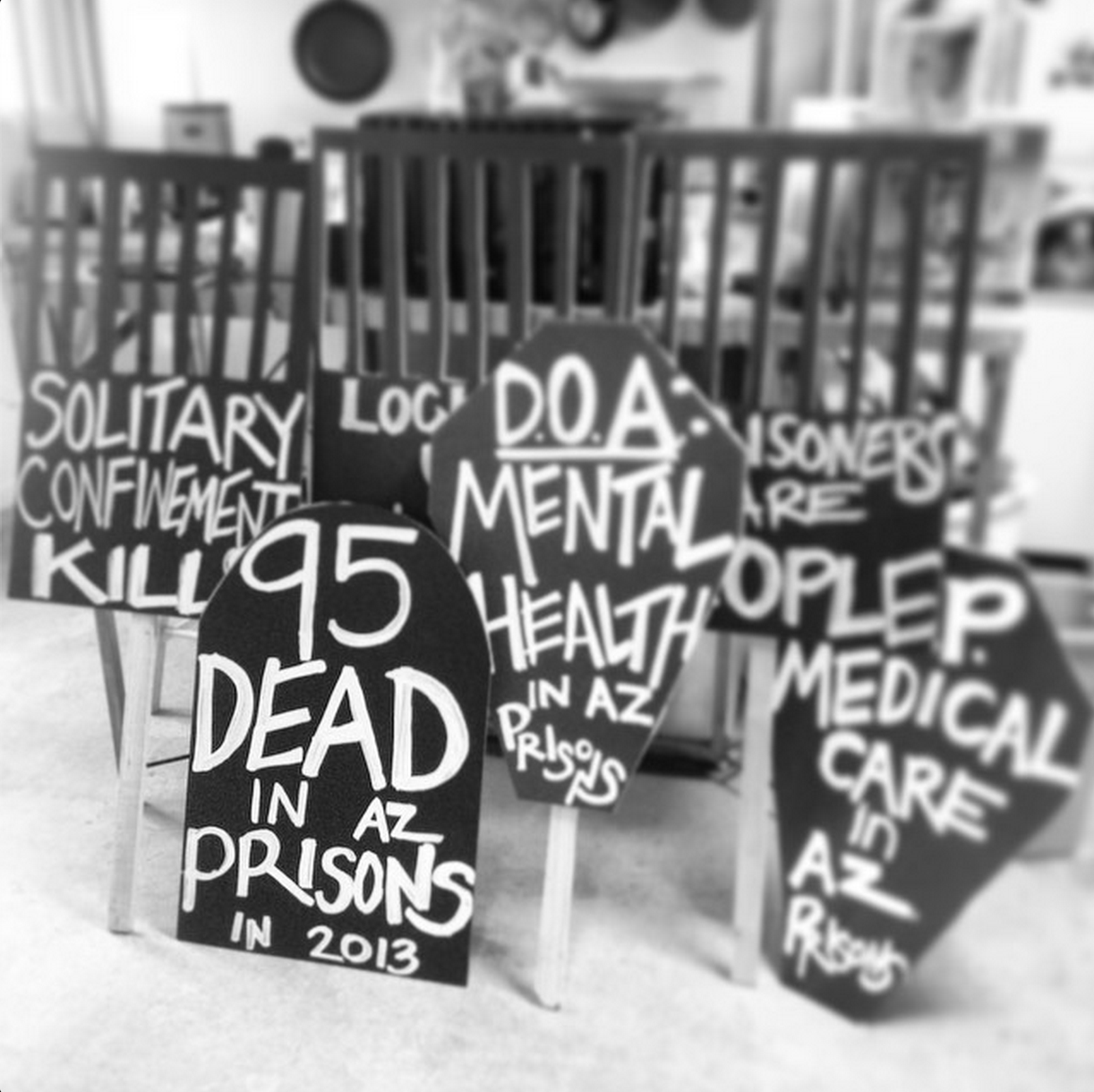 AFSC Arizona hosted a press conference on Monday December 1st, 2014 to announce the release of our newest report, Still Buried Alive: Arizona Prisoner Testimonies on Isolation in Maximum-Security (2014). This report is distinctive from other reports that we have released, in that it is predominantly filled with the words that were written to us by people in maximum-security prisons in Arizona. And the recommendations that we make at the end of the report are based on those testimonies provided to AFSC Arizona by the men and women who endure prolonged isolation every day for years at a time.
AFSC Arizona hosted a press conference on Monday December 1st, 2014 to announce the release of our newest report, Still Buried Alive: Arizona Prisoner Testimonies on Isolation in Maximum-Security (2014). This report is distinctive from other reports that we have released, in that it is predominantly filled with the words that were written to us by people in maximum-security prisons in Arizona. And the recommendations that we make at the end of the report are based on those testimonies provided to AFSC Arizona by the men and women who endure prolonged isolation every day for years at a time.
“I have spent about 9 years of my 21 years in prison in supermax lockdown. Too many to list by date.”
Following the press conference, I was asked how we verified the truth of what had been documented in the pages and pages of prisoner letters sent to the AFSC Arizona office. As if we should assume that we were being lied to by people simply because they had been convicted of a crime. Shouldn’t we instead be asking similar questions to people like ADC Director Charles Ryan when he tells us that we need a new $50 million maximum-security prison even when Arizona already has the sixth highest rate of incarceration in the country?!?
“For starters, Charles Ryan claims that we’re only locked in our cells for 22 hours a day. Either this is another lie on his behalf or he just has no idea what’s going on in his own facilities.”
I responded by saying, “We at AFSC have the radical notion that just because someone is in prison does not mean that person is lying to us.” Unsurprisingly that quote didn’t make it into the story. It’s not a popular belief to assume that people who are incarcerated are trustworthy. For that matter it’s not popular to believe that they are people to begin with, because then we might have to confront the reality that what we are doing to them in our maximum-security prisons is in fact torture.
“This is inhumane. I’ve seen many people mentally break down. I’ve seen the physical health of people deteriorate. Inmates that I know in here have committed suicide! The conditions are extremely poor. Something has got to be done about this. Why is the state being funded to destroy one’s mind? Why are the officials not being funded to repair one’s mind?”
I went on to explain that AFSC Arizona has been communicating with prisoners for decades, and specifically monitoring the use isolation in Arizona’s maximum-security prisons for nearly 10 years, and unfortunately the descriptions of their conditions of confinement hadn’t changed much. In fact, the responses from the 41 men and women that make up Still Buried Alive are so consistent that there were times that I thought I was re-reading testimonies from the same person. The details of confinement, the exact number of hours, descriptions of cells, lighting, and practices – all of these were so precise there is no reason to imagine that any of it could possibly be made up. Even the way isolation made people feel was consistent. Over and over people described being treated like an animal or worse than an animal, or as becoming something less than human that they never were before being in solitary.
“Why would you want to treat people like this, then set them free with no skills, not knowing how to deal with people, offering no programs, and wonder why so many return to prison for violent crimes. [If] you treat humans like animals, they become animals. You’ll spend money on new prisons, but cut funding for everything that will help people stay out of prison.”
There is no doubt in my mind that these men and women are telling the truth, but I shouldn’t have to tell you that. None the less, as long as we can question the authenticity of their words, inaction on issues of solitary confinement, prisoner neglect, and mass incarceration maintains some semblance of acceptability. Prisoner voices matter. Confronting mass incarceration and torturous practices such as solitary confinement must include the opinions and perspectives of our incarcerated sisters and brothers. And in order for that to happen we must put aside unfounded biased assumptions that just because someone is in prison makes them automatically untrustworthy. Prisoner voices matter.
Categories: News & Updates, Prisoner Testimonies, Solitary Confinement